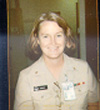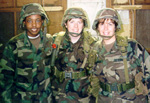Operation Iraqi Freedom
Ambulatory nurses ready, eager to serve
by Cindy AbolePublic Relations
As Operation Iraqi Freedom heads into its second week and war activities intensify, more and more of America’s soldiers and reserve military force are being called away from their civilian jobs and lives to support the allied war effort. For some, their jobs are no different than the work they perform full-time in their careers.
For three ambulatory surgical nurses at MUSC, just waiting and preparing to be called pose enough anxiety for themselves, their co-workers and families. So this trio of nurses have formed a supportive, sisterly-like bond that has helped guide them through a checklist of paperwork and activities, details and other strains and stresses as they wait.
 Dottie
Aimar
Dottie
Aimar
Navy reserve nurse Dottie Aimar has more than nine years of reserve service and is currently assigned to a Charleston unit composed of other nurses, pharmacy technicians and other medical specialists. For the past few months, Aimar, a lieutenant commander, has tried to prepare herself and her family for possible deployment in support of the war in Iraq. Aimar, a wife and mother of three, and her husband have talked frankly about the war and its effects on their lives as a family. She knows they unanimously prefer mom to “stay at home” but are supportive of her duty and mission.
The support is especially helpful to ambulatory surgery nurse anesthetist Tammy LaMont. A captain in the U.S. Army Reserve, LaMont is a wife and mother of three small children ages 6, 4 and 2. Although she grew up in a military family, the reality of war and the possibility of being away from her family is challenging. With no family in town, LaMont and her husband have been busy planning alternative arrangements for child care and finalizing other preparations in the event she is deployed.
 Army
Capt. Tammy LaMont, right, training with fellow nurses at Camp Bullis in
Texas.
Army
Capt. Tammy LaMont, right, training with fellow nurses at Camp Bullis in
Texas.
“We’ve talked a lot about the news and information concerning activation and other paperwork prior to the war’s start,” said LaMont, regarding her fellow nurse-reservists. “Each has been so helpful by sharing their knowledge and talking about experiences.”
LaMont has even taken some time to talk to her eldest son, Hunter, 7. “Like some young kids, they get confused and look at a uniform and somehow equate it to war, guns and death,” LaMont said. “We’ve talked some more since then and I think he has a clearer idea of what’s going on.”
“I’m supportive of our country’s efforts and wish I could go,” said LaMont, who is stationed with an Army medical group based at Fort Jackson in Columbia. She has a brother who was recently activated by the USAF. “Caring for the troops is small compared to the sacrifices these men and women make on the frontline everyday,” she said.
Air Force Reserve Lt. Col. Brenda Egan is no stranger to conflict. As the veteran of the group, she has about 20 years military service—10 of those years spent as a flight nurse.
Besides counseling among themselves, the trio have been attentive helping to keep their nurse managers and other staff informed about their reserve status.
“We’re getting good support from co-workers and staff at work,” Egan said. “Even neighbors and friends have offered to help out by finding ways to support and be protective of us and our families.”
But nothing can equal the tension and anxiety of waiting.
“It’s frustrating not knowing,” said Egan, who in early March reported
the nervousness and jittery feelings she and others were experiencing.
In mid-March, Egan was called to duty to support activities with the USAF
437th Airlift Wing Medical Group. She is currently awaiting further
orders but keeps in touch with her friends via e-mail.
Catalyst Online is published weekly, updated as
needed and improved from time to time by the MUSC Office of Public Relations
for the faculty, employees and students of the Medical University of South
Carolina. Catalyst Online editor, Kim Draughn, can be reached at 792-4107
or by email, catalyst@musc.edu. Editorial copy can be submitted to Catalyst
Online and to The Catalyst in print by fax, 792-6723, or by email to petersnd@musc.edu
or catalyst@musc.edu. To place an ad in The Catalyst hardcopy, call Community
Press at 849-1778.